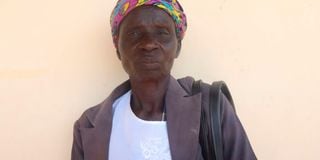Succession misery: 64-year-old Homa Bay widow's quest to own land

What you need to know:
- Jane Abongo believes that someone is out to grab her land.
- Her trouble started sometime in 2022 when her family agreed to share the land belonging to her husband.
For the past two years, Jane Abongo has made several trips from her home in Kamenya, Kochia ward, to Homa Bay town to look for the title deed of her land.
The 64-year-old widow has been visiting the lands office to try and sort out a mistake that was made when the land belonging to her husband was being subdivided.
She believes someone is out to grab her land. Ms Abongo, however, vows to protect it by all means.
Her trouble started sometime in 2022 when her family agreed to share the land belonging to her husband. She is the first widow of the man.
“We had a successful succession process and we were waiting for title deeds. I was, however, surprised when the documents came bearing different names from the ones we forwarded," the senior citizen says.
At her home are three parcels of land, which were given to three widows. Each woman was supposed to invest in her land.
Ms Abongo says she chose to put up rental houses on hers. The houses were on one side while the planted trees were on the other.
However, when the titles were issued to the three widows after land succession, Ms Abongo discovered that her land was taken and given to one of her co-wives.
“Instead of being given the title for the piece of land where I have invested, I got a title for a land that is bare and should belong to another person," she says.
Ever since, she has been travelling to the land office to correct the mistake.
She, however, might not correct the mistake soon because her co-wife who has her title deed has not consented to amendments on the title deed.
It is thought that the mistake could have happened when the family started land succession.
The process usually involves the family agreeing on how to subdivide the land of a deceased person.
Chiefs are then brought on board as a third party to help the government identify the people who should inherit such properties.
However, some chiefs are accused of colluding with some family members to deny others, especially women, the right to own land.
“I believe someone intentionally altered my name with another person’s name,” Ms Abongo says.
Her case is a mirror of hundreds of others, where women lose their land because of failure by administrators to note down the genuine heirs of deceased person’s property.
Homa Bay County Commissioner Moses Lilan says there are a lot of cases of land disputes involving families in the region.
He says some cases have resulted in deaths and injuries when people fight over property. The administrator blames chiefs for being behind some land disputes.
“Chiefs should not put personal interests on land. This especially applies to land where succession has not been done," Mr Lilan says.
According to the county commissioner, some chiefs deliberately write letters to courts and indicate wrong beneficiaries who end up getting deceased person property when the rightful heirs are left to suffer.
He says this has led to fights.
"Let all chiefs write the rightful beneficiaries of the property of the deceased. We are witnessing cases where people fight because chiefs are misadvised," he says.
The government noted that the problem is widespread in Ndhwia where some chiefs omit names of women while compiling a list of beneficiaries of a deceased person's property.
Close relative
After the death of a person, the ownership of his or her property, especially land, is passed on to their close relations.
Succession process usually involves the area chiefs who assist the Judiciary to determine land succession by identifying genuine family members of the deceased person.
Chiefs are required to write an introduction letter to the court explaining to the judge or magistrate the relationship between the individuals listed and the deceased.
The process is usually undertaken in court with children and spouses being the major beneficiaries.
However, in some situations, women and their daughters would be sidelined during succession of property. This has been the case in several areas until the government and non-state actors noticed the trend and decided to act.
According to Ndhiwa Principal Magistrate Everline Onzere, some chiefs would deliberately fail to tell the court that a deceased person had female children.
Some chiefs even go to the extent of failing to tell judicial officers that the deceased person had a wife or wives.
Ms Onzere says attention was only given to male children who benefitted more than their mothers and sisters. In such circumstances, when the court determines land succession, female children and their mothers would be left out and fail to get a share of the property of the deceased.
“The law allows women to inherit property, including land. Chiefs have been asked to ensure they list the names of all the family members when succession is being done,” Ms Onzere says.
The problem is attributed to cultural beliefs. Some people still believe that women are not entitled to property ownership after their husband dies.
The land the couple co-owned ceases to be hers and is automatically transferred to the in-laws.
“It is illegal to use, lease or sell land belonging to a deceased person before the succession process,” Ms Onzere says.
The Habitat for Humanity Kenya recently conducted an assessment in Ndhiwa. It established that the majority of the people are ignorant of the land ownership process, especially succession.
Ms Millicent Adhiambo, the advocacy lead person at the organisation, says the challenge mainly hurts women residing in the rural areas.
She says some of them are driven out of their land because of lack of knowledge on property ownership.
Kamdar Kawanga sublocation was found to be one of the areas where land matters are a serious challenge.
"Women are kept in the background when land matters are being discussed and their opinion never counts. Most widows in the area were found not to own any land, despite their husbands having been the original landowners," Ms Adhiambo says.
Habitat for Humanity Kenya recently organised a three-day land clinic in Got Kojowi where land experts, including Lands ministry officials, surveyors and adjudication officers, were called to engage residents about land ownership.
Officials from the National Lands Commission and the Judiciary, the Law Society of Kenya and the national government administrators were also called to give their perspectives about land ownership.
Ms Adhiambo says a lot of widows suffer in silence after the death of their husbands.
“We want community members to have increased awareness about land and increased access to title deeds. Specifically, we want women to know their rights to land ownership," she says.
During the exercise, some cases of illegal land transfers were discussed and referred to relevant agencies for necessary action.
Ms Onzere says most of the cases she handles at Ndhiwa Law Court have land matters linked to them. She says land is a sign of wealth and that is the reason many Kenyans aspire to landownership.
However, she says that some people use unjust means to acquire land, resulting in cases such as arson, murder, assault, destruction to property.
“Most of the cases where people fight over land involve relatives and close family members. We need to find a quick solution to these disputes and reduce the backlog of land cases in our courts," the magistrate says.
Ms Onzere told women to actively take part in land issues, including sale and ownership. She also asked men to inform their wives whenever their families intend to sell land.
“Should the wife oppose the sale; the husband should listen to her. Ensure the right procedure is followed to avoid court nullification," the magistrate says.
The judicial officer said chiefs have undergone training in how to write introductory letters when informing the court about a family where a land succession is concerned.
Dispute resolution
According to Ndhiwa Deputy County Commissioner Ahmed Somo, the main factor fuelling land disputes in the region is succession and most families do not take the matter to court.
He says some people in Ndhiwa still believe in cultural issues where women are not allowed to inherit land and when families fail to go through judicial process, women are sidelined when land is being subdivided.
"Adjudication process in the region has been dragging on for years. It has also fuelled land disputes as it delays issuance of title deeds," Mr Somo says.
Homa Bay has nine sub-counties with all land officials stationed in Homa Bay town. Mr Somo says sometimes the officials take a lot of time to solve land disputes.
“When land disputes take long, some families would resort to violence leading to increased conflict. Whoever is not convinced with the land register report should always seek advice from the court," the administrator says.
The Judiciary has introduced court annexed mediation where it tries to resolve land disputes using mediators.
When a land case is introduced in court, the magistrate weighs in on it. It can then be referred to a mediator who can resolve the matter.
Judiciary pays the mediators and litigants are given 60 days to solve land disputes. Mediation can also be offered by the chief. The system is meant to reduce case backlog in courts.
In a circumstance where that fails, it is registered as an active case.
Only last month, widows in Siaya County drafted a bill dubbed The Widows Protection Bill, which was tabled before the county assembly for debate.
The Bill was meant to safeguard women against retrogressive cultural practices, including land inheritance.





